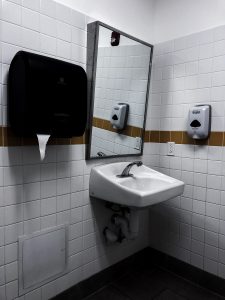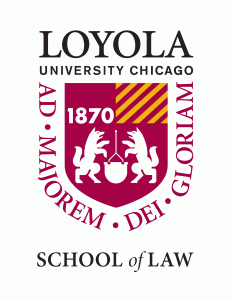Using the bathroom that corresponds to your gender is something most people do every day without thinking twice. But what if instead of a mundane everyday occurrence, it was something you had to fight for? For transgender students, bathroom use is fraught with complication.
In May of 2016, under the Obama administration, the U.S. Departments of Justice and Education issued statements clarifying that Title IX protected the rights of transgender students to use the bathrooms and locker rooms that match their gender identity.

Photo by Jahongir Ismoilov on Unsplash
However, the Trump administration rescinded these protections in February 2017, stating that the previous policy did not “contain extensive legal analysis or explain how the position is consistent with the express language of Title IX, nor did they undergo any formal public process. This interpretation has given rise to significant litigation regarding school restrooms and locker rooms.” The Departments of Justice and Education also released a letter stating that there “must be due regard for the primary role of states and local school districts in establishing educational policy.”
On June 15, 2020, the Supreme Court held in Bostock v. Clayton County that Title VII protections extend to gender identity and sexual orientation. Discrimination against a person based on their gender identity or sexual orientation will now be considered discrimination against that individual based on their sex, instead of discrimination against LGBTQI+ people as a group. The Court stated that its ruling only applies to Title VII, and sex-segregated bathrooms and locker rooms are not directly addressed by the decision. However, courts frequently rely on Title VII decisions to inform Title IX rulings, and schools should expect renewed questions grappling with bathroom and locker segregation rules under a Bostock framework. Courts that interpret gender identity as sex may find themselves clashing with the Department of Education’s position on the matter.
Chicago Suburban High School Policy Struggle
In the suburbs of Chicago, a massive legal battle regarding locker room use involving transgender students recently took place between a community group called Students and Parents for Privacy and Palatine Township High School District 211. The skirmish began in 2013, when a student known as “Student A” filed a complaint with the U.S. Department of Education’s Office of Civil Rights. She had been refused access to the girls’ locker room and was forced to use an isolated restroom as her changing area. The complaint contended that the District’s policy of having transgender students change in isolated and separate rooms violated Title IX of the US Education Amendment of 1972. The Office found the school district had violated Title IX and issued a ruling promising to work with them to end discriminatory policy and practice against transgender students in November of 2015.
However, in May of 2016, Students and Parents for Privacy filed a lawsuit against the U.S. Department of Education, the U.S. Department of Justice, and District 211. The plaintiffs asked the court to issue a preliminary injunction that would require the District to compel students to use bathrooms and locker rooms based on their assigned sex at birth. The American Civil Liberties Union, the ACLU of Illinois, and Mayer Brown LLP filed a motion to intervene on behalf of transgender Illinois high school students through the student’s parents and the Illinois Safe School Alliance. After briefs were filed and oral arguments were heard, the Magistrate Judge, Jeffery T. Gilbert, issued a report recommending denial of plaintiff’s motion. He stated that the plaintiffs had not shown they would suffer irreparable harm or that they lacked an adequate remedy under the law.
The four-year fight ended on November 14, 2019, when Palatine School District voted to give transgender students unrestricted access to the bathrooms and locker rooms of their choosing.

Photo by Roel Dierckens on Unsplash
The language of the new policy states that students “shall be treated and supported in a manner consistent with their gender identity, which shall include students having access to restrooms and locker rooms that correspond to their gender identity.” The policy requires that students and parents formulate a plan with the school district to be implemented by January 1, 2020.
New Bathroom Blueprints at Loyola University School of Law
Transgender bathroom arguments can also be heard in the hallways of Loyola University Chicago School of Law. OUTLaw, Loyola’s LGBTQIA+ advocacy and support student organization, led the charge with support from the Student Bar Association. Loyola law graduates Rachel Johnson and Carly Helman were the main drivers of the efforts. Rachel and Carly, who both identify as non-binary, had successfully advocated for gender-neutral bathrooms at their undergraduate institution, Beloit College. During their 1L year at Loyola, they uncovered only one gender-neutral bathroom in the law school, far away from the law school floors. Hoping to push for more accessible gender-neutral bathrooms, Helman, Johnson, and the director of Loyola’s weekend JD program, Kirk Walter, encouraged Loyola to create a multi-stall, gender-inclusive restroom on the twelfth floor of the law school.
Despite support from the administration, the organizers were notified by the Facilities department that the gender-neutral bathroom would be in violation of Chicago Building Code 18-29-403.3. The Code states, “The required water closets, lavatories, and showers or bathtubs shall be distributed equally between genders based on the percentage of both genders anticipated in the occupant load. The occupant load shall be composed of 50 percent for both genders, unless statistical data approved by the building commissioner indicate a different distribution of both genders.” Since the multi-stall, gender-inclusive bathroom would replace the men’s room, it would upset the required balance.
The organizers didn’t back down in light of this challenge. A new plan was formulated: starting in Summer 2021, there will be multiple single-stall gender-neutral bathrooms on multiple floors to replace the original gender-neutral bathroom plan. Until then, Loyola will be posting signs encouraging students to use the bathroom that most closely aligns with their gender identity. Although this plan will possibly alleviate bathroom anxieties for many trans students, it “obviously has some issues for folks who are outside of the traditional gender binary,” says Helman.
Loyola law graduate Justin Sia initially hoped to amend the Chicago Building Code, but pivoted to a state-wide strategy when “we found out that the Chicago plumbing code is potentially preempted by Illinois plumbing law, which we were told sets the floor for all municipalities to follow. While proposing amendments to the Illinois law brings up new challenges, we are excited to advocate for a more inclusive Illinois, rather than just a more inclusive Chicago.”
Illinois passed a bill in 2019 entitled “The Equitable Restrooms Act” that requires all single-occupancy public bathrooms to be labeled as gender-neutral starting January 1, 2020. The bill specifically requires all “places of public accommodation” or “public buildings” to outfit their single-occupancy bathrooms with outward signs. The signs must be devoid of a gender indicator and mark it as a bathroom. The law passed with a 109-5 vote in the House and unanimously in the Senate.
Sia is currently pushing for an amendment to the Equitable Bathrooms Act that would allow public and private buildings across the state, including schools, to implement gender-inclusive, multi-stall restrooms. These gender-neutral restrooms, if implemented, must include stalls with solid locks and privacy strips that cover the cracks between stalls. The amendment would also allow for every individual toilet to be counted towards the quota of male or female ratio requirements, which would circumvent the Plumbing code’s current roadblock.
(Readers can contact Justin Sia at jsia@luc.edu to express support, ask questions, or provide suggestions regarding the proposed amendment.)
Jesse Tobin earned his JD at Loyola University Chicago School of Law.

